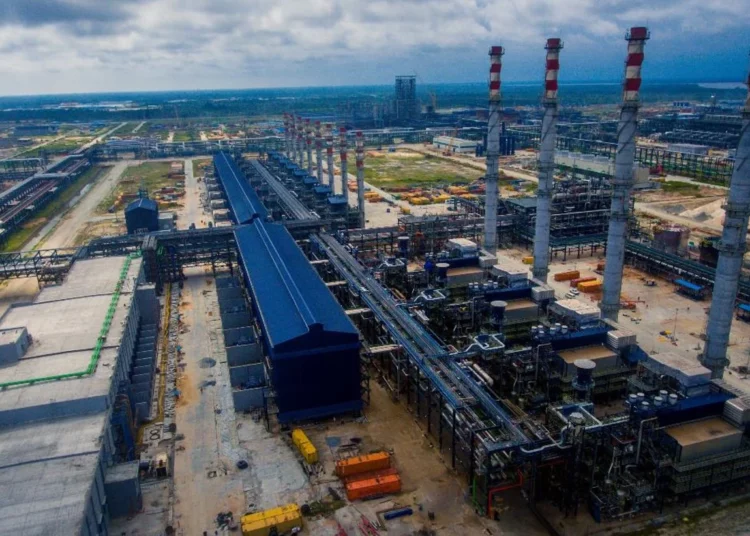Recently, Dangote Petroleum Refinery and Petrochemical Complex in Ibeju-Lekki, Lagos, was commissioned by President Muhammadu Buhari in one of his last significant official engagements before exiting office tomorrow, May 29.
An initiative of serial entrepreneur and Africa’s richest man, Aliko Dangote, the 650,000 barrels-per-day (BPD) capacity single train refinery is the largest in the world.
The refinery complex includes a refinery, a petrochemical plant, a urea fertiliser plant, and a subsea pipeline project. It is said to have the capacity to produce one million metric tonnes of polypropylene per annum while the urea fertiliser plant will be able to produce three million metric tonnes of urea annually.
When fully operational, the $18.5 billion ultramodern refinery is designed to process not only the Bonny Light grade of crude oil, but also a wide variety of other crude streams, including many from Africa, some Middle Eastern streams, and the US Light Tight oil. The Dangote Refinery is equally capable of delivering all types of liquid products, including gasoline, diesel, kerosene, and aviation fuel.
The advantages this new refinery will confer on Nigeria are numerous. Given that Nigeria’s domestic fuel consumption is about 450,000 barrels per day, the refinery is more than able to meet all of Nigeria’s domestic needs and stop the import dependency syndrome in the petroleum sector as well as the corruption and inflation that come with it. It will also help in generating export revenues for the country.
According to the Central Bank of Nigeria governor, Godwin Emefiele, Nigeria spent over $26 billion in 2022 alone importing petroleum products, fertiliser and other petrochemicals, which is about $8 billion more than it cost to build the Dangote refinery. Inexplicably, the cost of petroleum products imports into Nigeria nearly tripled within a period of five years in Buhari’s administration, rising from about $8.4 billion in 2017 to $23.3 billion by the end of 2022.
Job creation is another area where Nigeria will benefit immensely from this refinery project. According to Dangote, about 33,000 employees are already working at the facility, while the CBN governor projects that it will provide over 135,000 permanent jobs for Nigeria. Numerous other indirect jobs will also be created by ancillary firms servicing the refinery.
The refinery will also generate up to 12,000MW of electricity which will bring some relief to Nigeria’s power supply deficit. In fact, the refinery will have multiplier effects on several sectors of the economy.
The project will expectedly avail Nigeria significant savings both in terms of foreign exchange and in easing the fiscal burden on the federal government. With nearly $30 billion foreign exchange savings from the reduction in petroleum imports, the economy is projected to benefit an extra $10 billion of foreign exchange inflow annually through the export of refined petroleum products. This will further boost the country’s depleted reserves and shore up the value of the naira against other currencies.
There is no doubt that this huge investment by Dangote will not only help to transform Nigeria’s economy from a heavy import dependent nation to a net exporter in some critical industries, including cement and fertiliser, but also earn some respect for the nation among its peers, for it is a shame that Nigerian was the only major oil nation that imported almost all of its refined products needs.
As a newspaper, we are relieved and saddened in equal measure. Relieved that Nigeria will soon exit the economic hemorrhaging due to import dependency and a dodgy subsidy regime that has practically crippled the country fiscally; saddened that the country’s decades of failure of governance due to corruption, ineptitude, criminal negligence and economic sabotage made it practically impossible to have working and workable refineries in Nigeria, despite the country having four refineries and all the turnaround maintenance that cost the nation billions of naira. The trite argument some people are quick to make is that government cannot run business successfully. That is not correct. In other climes, national oil companies like Saudi Aramco, National Iranian Oil Company, Kuwait Petroleum Corporation, Rosneft (Russia) and Petreleos de Venezuela, to mention few, are government-owned oil companies that successfully run efficient refineries that satisfy their countries’ domestic needs and export the rest to non-oil producing countries. Bharat Petroleum Corporation Limited, India, is the largest government-owned refinery in the world, with a refining capacity of 1.2 million barrels per day. All these oil companies are run by public servants.
What is at issue is that Nigeria’s political leaders and government officials treat their responsibilities with levity, criminal conspiracy and negligence and, sadly, they get away with it due to the lack of accountability in public service. In this country, we have seen turn around maintenance projects and petroleum importation jobs awarded on the basis of political patronage. Expectedly, the nation and citizens suffered rip-offs.
We agree with Emefiele that Dangote’s feat is a strong testament to the fact that with right leadership characterised by dedication, focus, commitment, and resilience, the country can achieve its national goals. If a Nigerian like Dangote can achieve it, there is no reason Nigerians in public service cannot run our nation’s refineries successfully if they mean to. What it needs is just a change of attitude.





